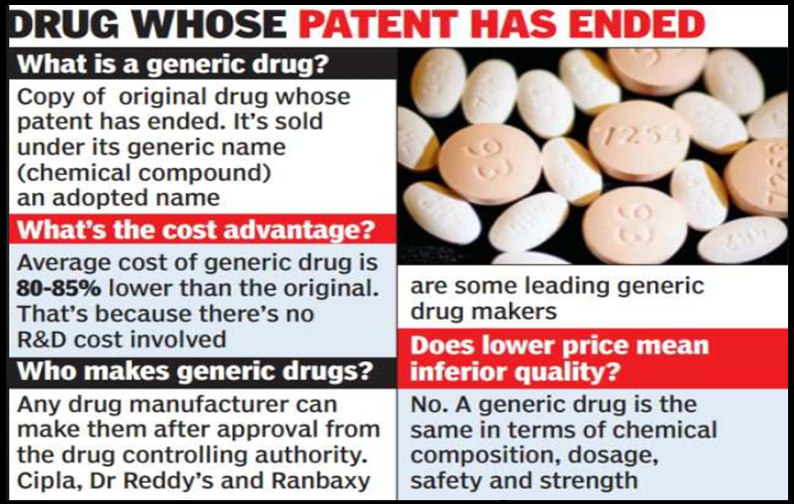Discuss the measures needed to ensure the accessibility and quality of pharmaceuticals, considering the withdrawal of the NMC’s directive on generic prescribing and the role of various stakeholders.
| Structure of Answer
Introduction · Briefly explain recent withdrawal of India’s National Medical Commission’s directive on generic prescribing and concerns associating the directive. Body · Mention Measures Addressing Accessibility Concerns with examples · Mention Measures Ensuring Quality of Pharmaceuticals, with examples · Mention role of various stakeholders in ensuring the accessibility and quality of pharmaceuticals Conclusion · Mention need for holistic approach to ensure both accessibility and quality of pharmaceuticals |
Answer-
Access to affordable and quality pharmaceuticals is a fundamental human right crucial for universal health coverage. The recent withdrawal of India’s National Medical Commission’s directive on generic prescribing, aimed at enhancing affordability, has raised concerns, Like escalating healthcare costs and reducing accessibility for low-income individuals

Source: Times of India
Measures Addressing Accessibility Concerns
- Strengthening Generic Drug Regulation: Enforce stringent standards for generic drug manufacturing and testing. Example: Implementing a transparent certification process for generic drugs.
- Enhancing Public Awareness and Education: Conduct public awareness campaigns on the benefits and safety of generic medicines. Example: Educational initiatives highlighting cost savings and equivalent efficacy of generics.
- Promoting Generic Prescribing Practices: Provide continuous medical education and incentives for healthcare professionals. Example: Offering financial incentives to doctors for promoting generic prescriptions.
- Exploring Alternative Pricing Mechanisms: Introduce reference pricing or tiered pricing to reduce the cost of branded drugs. Example: Implementing a tiered pricing system based on drug efficacy and affordability.
- Expansion of Janaushadhi Kendras: Expanding the network of Janaushadhi kendras to increase the availability of affordable generic medicines. Example: Emulating successful models like the Tamil Nadu Medical Services Corporation Limited’s approach to quality testing and distribution.
Measures Ensuring Quality of Pharmaceuticals
- Adherence to Manufacturing Standards: Ensure strict adherence to Good Manufacturing Practices (GMP) and international standards. Example: Regular audits and inspections of manufacturing facilities.
- Robust Regulatory Oversight: Conduct regular inspections of pharmaceutical facilities and implement stringent quality control measures. Example: Unannounced inspections to monitor manufacturing processes.
- Effective Pharmacovigilance Systems: Strengthen systems to actively monitor adverse drug reactions and identify quality issues. Example: Implementing a centralized database for reporting and analyzing adverse reactions.
- Incentivizing Industry Self-Regulation: Encourage pharmaceutical companies to self-regulate quality standards. Example: Recognizing and rewarding companies with exemplary quality control measures.
Role of Stakeholders in ensuring the accessibility and quality of pharmaceuticals
- Government Initiatives: Governments play a pivotal role in formulating and implementing policies that promote generic drug use. Collaborative initiatives, such as India’s ‘Make in India’ campaign, can encourage domestic production of quality generic drugs.
- Regulatory Collaboration: Work closely with industry and healthcare professionals to develop effective regulations. Collaborative forums for continuous dialogue and feedback. Example: Harmonization of regulatory standards, as seen in the European Union, can facilitate a consistent approach to pharmaceutical quality.
- Pharmaceutical Industry Involvement: Adhere to strict quality standards and collaborate with regulatory bodies. Example: Industry-led initiatives for quality assurance and compliance.
- Healthcare Professionals’ Role: Actively participate in promoting generic prescribing and patient education. Example: Inclusion of generic prescribing guidelines in medical education.
The withdrawal of the NMC’s directive on generic prescribing necessitates a holistic approach to ensure both accessibility and quality of pharmaceuticals. By addressing these aspects and fostering collaboration among stakeholders, a future healthcare landscape can be envisioned where every individual has access to affordable, high-quality medicines. Balancing the interests of the public, healthcare professionals, pharmaceutical companies, and regulatory bodies is crucial for the success of such initiatives in the pursuit of universal healthcare.





